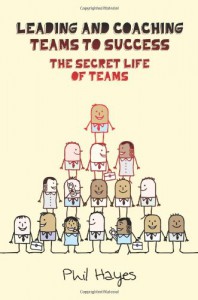Book Review: Leading and Coaching Teams to Success – Phil Hayes

LEADING & COACHING TEAMS TO SUCCESS- The Secret Life Of Teams- Phil Hayes (2011) Open University Press, McGraw Hill Education
The rear of the cover states “if you are a manager, coach or team leader and want to build a strong performing team of your own, then this book is for you!” I was pleasantly surprised to discover that these claims were borne out when the contents were explored. I think that this book can be used by a manager, a coach, a team leader, a trainer, a consultant or a facilitator, despite appealing to such a broad audience I found it accessible and contained aspects which I think could be used by all of the above, with value being added by the topics that the author covers.
The book is very much written from a practitioner’s perspective with the author drawing on over 20 years’ experience. What I particularly liked is the fact that as well as dealing with areas that had been successful, the author is prepared to share examples where things did not quite go according to plan , and explore reasons for those experiences and suggest how to avoid similar pitfalls in the future. I also found it a pleasant change for an author to share “what I tried to do” as a means of reviewing the exercises or approaches used.
The book consists of 160 pages and is an accessible, “readable” publication with a good mixture of theory, case studies, tools and suggested further resource sources. The eight chapters are designed in such a way that they can be “dip sampled” at will, without necessarily losing context or meaning. That being said, once the sampling commences it will be difficult to resist the temptation to devour the rest of the contents.

I found this book an excellent introduction to team related issues- be that leading teams, coaching teams or designing and delivering team training interventions. I particularly liked the way it deals with essential themes and skills that will be needed, providing excellent summaries of key principles, and providing additional resources for further research should the reader so desire. For example this is a book that covers coaching skills and theories with references to NLP and Gestalt models. It also explores when NOT to use the coaching approach, rather than simply reviewing the merits of a coaching approach.
Two chapters of interest deal with high performing teams and poorly performing teams and sets out the different approaches that can be used – with the author’s ability to draw on extensive experience coming to the fore with the use of practical examples and shared experience. I also found the chapter on further resources for team leaders and coaches an excellent source of ideas and resource sources. The way the book deals with diversity and cultural matters is also a welcome source for contemplation.
My only niggle is the fact that in Chapter 7,page 118, the author explains a tool that he uses that involves ropes, belts and coloured links and states “please see references and contact details in Chapter 8” – frustratingly I was unable to locate the cross-reference!
In summary this is a book that I have no hesitation in recommending to managers or team leaders as I think the topics can be readily accessed and understood by all. I also found that it was a useful source for coaches, trainers, consultants and facilitators- the use of case studies, practical tools and exercises are excellent additional resources to draw upon.
Martin Hill LL.B (Hons), FInstLM, AMAC, EMCC Member
Faculty Member
Programme Director for ILM 7 Coaching & Mentoring Courses






